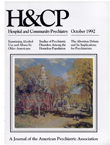Outcomes and Costs of Two VA Inpatient Treatment Programs for Older Alcoholic Patients
Abstract
One hundred thirty-seven older alcoholic patients were randomly assigned to two different inpatient treatment programs at a Veterans Affairs medical center and followed for one year after discharge. The older alcoholic rehabilitation (OAR) program was operated by a tolerant staff that specialized in treating elderly alcoholics. Treatment included reminiscence therapy with goals of developing patient self-esteem and peer relationships. The traditional care program emphasized confrontation to focus on patients' past failures and present conflicts. Patient care costs were slightly lower (2.5 percent lower) in the OAR program than in the more traditional program, and OAR patients were 2.1 times more likely to report abstinence at one year. Response to the OAR program was best for patients over 60 years of age.
Access content
To read the fulltext, please use one of the options below to sign in or purchase access.- Personal login
- Institutional Login
- Sign in via OpenAthens
- Register for access
-
Please login/register if you wish to pair your device and check access availability.
Not a subscriber?
PsychiatryOnline subscription options offer access to the DSM-5 library, books, journals, CME, and patient resources. This all-in-one virtual library provides psychiatrists and mental health professionals with key resources for diagnosis, treatment, research, and professional development.
Need more help? PsychiatryOnline Customer Service may be reached by emailing [email protected] or by calling 800-368-5777 (in the U.S.) or 703-907-7322 (outside the U.S.).



